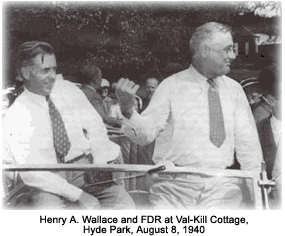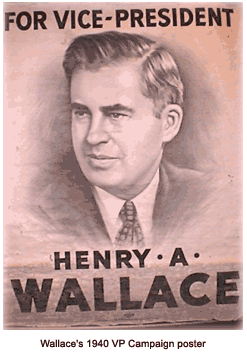Henry Agaard Wallace was vice president under Franklin D. Roosevelt during Roosevelt`s third term in office. His politics proved too progressive for the Democrats and he was replaced with Harry S. Truman on the 1944 ticket. Had this not happened, Wallace would have become president in early 1945 and postwar history would have been significantly different.
Henry Wallace was born on a farm near Orient in Adair County, Iowa, on October 7, 1888. He graduated from Iowa State College in Ames in 1910. For most of the next two decades, until 1929, he was on the editorial staff of the family’s journal, the Wallace`s Farmer, which was published in Des Moines. During Wallace`s last five years, he was the editor. His knowledge of agriculture was extensive and he published many articles on the subject. He also was involved in efforts to breed high-yield strains of corn.
 In 1933, Roosevelt appointed Wallace Secretary of Agriculture, a post he held until September 1940, when he resigned because of his nomination for vice president. Roosevelt was so adamant about Wallace`s nomination that he had prepared a letter of resignation, had Wallace not been chosen.
One of Wallace`s immediate tasks was to reduce the grain surplus. Wallace, along with Assistant Secretary of Agriculture Rexford Tugwell and others, authored the first major New Deal agricultural legislation, the Agricultural Adjustment Act of 1933. That radical legislation, later found unconstitutional by the U.S. Supreme Court, had the goal to "relieve the existing national economic emergency by increasing agricultural purchasing power." Local boards consisting of farmers were established to determine the production of farm commodities in their own communities. Unfortunately, by the time the act was passed, farmers had already planted their crops. Making one of the most difficult decisions of his life, Wallace ordered the destruction of six million hogs and 10 million acres of cotton in an effort to bring the surpluses down.
The Court struck down the act in 1936 because Farming was not considered to be interstate commerce and therefore could not be regulated by the federal government. Years later Wallace would see the AAA as one of his crowning achievements.
In 1933, Roosevelt appointed Wallace Secretary of Agriculture, a post he held until September 1940, when he resigned because of his nomination for vice president. Roosevelt was so adamant about Wallace`s nomination that he had prepared a letter of resignation, had Wallace not been chosen.
One of Wallace`s immediate tasks was to reduce the grain surplus. Wallace, along with Assistant Secretary of Agriculture Rexford Tugwell and others, authored the first major New Deal agricultural legislation, the Agricultural Adjustment Act of 1933. That radical legislation, later found unconstitutional by the U.S. Supreme Court, had the goal to "relieve the existing national economic emergency by increasing agricultural purchasing power." Local boards consisting of farmers were established to determine the production of farm commodities in their own communities. Unfortunately, by the time the act was passed, farmers had already planted their crops. Making one of the most difficult decisions of his life, Wallace ordered the destruction of six million hogs and 10 million acres of cotton in an effort to bring the surpluses down.
The Court struck down the act in 1936 because Farming was not considered to be interstate commerce and therefore could not be regulated by the federal government. Years later Wallace would see the AAA as one of his crowning achievements.
 Henry A. Wallace was elected on Roosevelt`s ticket in November 1940 and was sworn in as vice president in 1941. He took an extremely active role in the administration, more than any previous vice president, and became an example for future vice presidents. Due to strained relations with Congress, he was not effective as the President of the Senate.
The high point of Wallace`s influence was reached in 1943, when he toured countries in Latin America. His low-key approach, willingness to speak in Spanish, and evident concern for the people of those countries, were well received. Following his visit, 13 Latin American countries severed relations with Axis governments. Wallace`s concern for the welfare of Latin American countries led to his insistence that any supply contracts made with Latin American countries, through the Board of Economic Warfare, include a “labor clause” that stipulated producers had to pay their workers equitably and provide them with a safe working environment.
Unfortunately, Wallace`s long-running conflicts with conservative Southern elements of the Democratic Party became increasingly public. His unabashed idealism also made big city bosses nervous. When the Democrats gathered for their 1944 convention, Wallace discovered that although he was generally supported by registered Democrats in the country, conservative Democrats were trying to wrest the vice-presidential nomination away from him. In fear of losing his position, Wallace nevertheless made a politically suicidal speech at the convention regarding his views on civil rights. He said,
Henry A. Wallace was elected on Roosevelt`s ticket in November 1940 and was sworn in as vice president in 1941. He took an extremely active role in the administration, more than any previous vice president, and became an example for future vice presidents. Due to strained relations with Congress, he was not effective as the President of the Senate.
The high point of Wallace`s influence was reached in 1943, when he toured countries in Latin America. His low-key approach, willingness to speak in Spanish, and evident concern for the people of those countries, were well received. Following his visit, 13 Latin American countries severed relations with Axis governments. Wallace`s concern for the welfare of Latin American countries led to his insistence that any supply contracts made with Latin American countries, through the Board of Economic Warfare, include a “labor clause” that stipulated producers had to pay their workers equitably and provide them with a safe working environment.
Unfortunately, Wallace`s long-running conflicts with conservative Southern elements of the Democratic Party became increasingly public. His unabashed idealism also made big city bosses nervous. When the Democrats gathered for their 1944 convention, Wallace discovered that although he was generally supported by registered Democrats in the country, conservative Democrats were trying to wrest the vice-presidential nomination away from him. In fear of losing his position, Wallace nevertheless made a politically suicidal speech at the convention regarding his views on civil rights. He said,
"The future belongs to those who go down the line unswervingly for the liberal principles of both political and economic democracy regardless of race, color, or religion. In a political, educational, and economic sense there must be no inferior races .... The future must bring equal wages for equal work regardless of sex or race."On the first ballot, Henry A. Wallace received more votes than Henry Truman, but it was not enough. Eventually, the nomination went to Truman. Wallace campaigned for the Roosevelt-Truman ticket and was rewarded with a cabinet position, Secretary of Commerce. After Roosevelt`s death, he remained in the cabinet, but his outlook on world affairs grew more and more out of step with Truman`s "get tough" attitude. In September 1945, Wallace took the position that sharing atomic secrets with the Soviets was in America`s long-term interest. Wallace had witnessed the increasing strain on relations with the Soviet Union and had gone to great lengths to try to prevent the beginning of the Cold War. After visiting their country in 1944, he believed in the Soviet people, even though he thought their government was flawed. He also believed that the Soviets would eventually discover the secrets of the atom anyway because of their advancements in solar radiation, atmospheric ionization, and atomic fission. When news of the cabinet`s discussions was leaked, people began to say that Wallace was trying to give the Russians the bomb. Eventually, Henry Wallace`s relationship with Truman deteriorated completely and on September 20, 1946, the president removed him from his cabinet post. Wallace then assumed the Progressive Party leadership and became its candidate for president in 1948. In a four-way race, Truman carried the election, and Wallace placed a distant fourth. Wallace continued his leadership of the Progressive Party until the outbreak of the Korean War. When Wallace denounced the invasion and no other party leader followed suit, he resigned his position. He continued to make trips to South America, however, until his last one in 1964 when he noticed numbness in his legs. He was suffering the onset of amyotrophic lateral sclerosis, more commonly known as Lou Gehrig`s disease. A scientist until his death on November 18, 1965, Henry A. Wallace continued with his activities as he was able and maintained a journal of the progression of the disease in hopes that it would help other scientists find a cure.